Wix vs Shopify compared: Choosing the perfect e-commerce platform for your business
- 01Wix vs Shopify: overview
- 02What's the difference between Wix and Shopify?
- 03Wix pros and cons
- 04Shopify pros and cons
- 05Wix compared to Shopify
- 06Shopify compared to Wix
- 07Features comparison
- 08Wix vs Shopify: Which is the best for your business?
- 09Promotions on E Commerce software
- 10Alternatives to Wix & Shopify
Access up to $63 savings on Wix & $1,150 on Shopify
Access up to $63 savings on Wix & $1,150 on Shopify
If you're in the market for an e-commerce platform to launch your online store, there are two prominent options that stand out: Wix and Shopify. These two platforms offer distinct features and functionalities, making it essential to make an informed decision that aligns with your business goals.
In this comprehensive comparison, we'll delve into the world of Wix vs Shopify, examining their unique strengths, differences, and specific use cases. Armed with this knowledge, you'll be better equipped to make the right choice for your e-commerce venture, ensuring it meets your business requirements, preferences, and objectives. Continue reading to discover which platform suits your needs best!
Wix vs Shopify: overview
Wix and Shopify are prominent contenders in the world of e-commerce platforms, each offering a unique set of features and capabilities.
Wix is distinguished by its user-friendly website builder, which empowers users to create visually appealing websites quickly. It provides an intuitive drag-and-drop interface, making it accessible for users of all technical backgrounds. Shopify, on the other hand, is renowned for its dedicated e-commerce focus. It provides a comprehensive suite of tools designed specifically for online retail.
In this Wix vs. Shopify comparison, we will delve deeper into the specifics of each platform, examining their strengths and weaknesses to help you make an informed decision about which one best suits your e-commerce needs. Let's explore the differences between these two leading e-commerce solutions to assist you in selecting the most suitable platform for your online business.
What's the difference between Wix and Shopify?
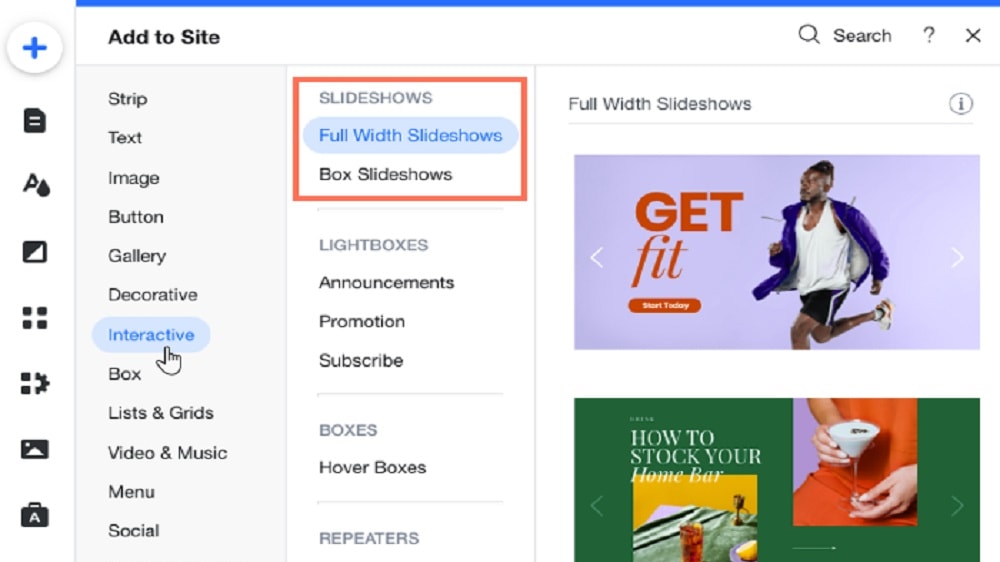

Wix and Shopify are both popular e-commerce platforms, but they have distinct differences that cater to different types of users and business needs. Understanding these distinctions is crucial in making the right choice for your online store.
First and foremost, the target audience for Wix and Shopify varies. Wix is a versatile platform that appeals to a broad audience, from beginners to experienced users. It is designed for those who seek an easy-to-use website builder with a wide range of customization options. Wix is an excellent choice if you want to create a visually appealing website quickly, with its intuitive drag-and-drop interface and various templates.
On the other hand, Shopify is specifically tailored for e-commerce businesses. It caters to entrepreneurs and businesses looking to establish, manage, and scale their online stores effectively. Shopify offers comprehensive e-commerce features, including inventory management, order processing, and payment processing, making it a top choice for businesses focusing solely on e-commerce.
Another notable difference lies in the pricing strategy. Wix offers a tiered pricing structure with various plans to suit different needs, including free options. This flexibility can be advantageous for small businesses or individuals looking to start an online presence without a significant financial commitment.
Shopify, however, follows a different pricing model. It offers subscription plans with fixed monthly fees, starting from a basic plan. While this means you won't find a free plan like Wix's, it includes essential e-commerce features even in its lower-tier plans. The pricing may be perceived as more straightforward for businesses solely focused on e-commerce.

10% off monthly or annual plans on Wix
Get 10% off monthly or annual plans on Wix and up to $63 savings with Secret.
Wix pros and cons
What are the advantages of Wix?
- User-friendly: Wix is known for its user-friendly drag-and-drop website builder, making it accessible to individuals with little to no technical expertise. You can easily create a website by simply dragging elements onto your page.
- Variety of templates: Wix offers a wide selection of professionally designed templates for various industries and purposes. This allows you to start with a pre-made design and customize it to fit your brand.
- App marketplace: Wix has an extensive app marketplace that provides additional functionality to your website. You can integrate features like contact forms, e-commerce, booking systems, and more through third-party apps.
- Cost-effective options: Wix offers a free plan with Wix-branded domain and hosting, which is a great option for those on a tight budget. Paid plans are also reasonably priced, with various features and resources.
- SEO tools: Wix provides basic SEO tools and features that allow you to optimize your website for search engines. You can customize meta tags, add alt text to images, and create SEO-friendly URLs.
What are the disadvantages of Wix?
- Limited design freedom: While Wix's drag-and-drop builder is easy to use, it can be restrictive for users who want more control over the design and layout of their website. Customization options may be limited compared to other platforms.
- Scalability: Wix may not be the best choice for large or complex websites that require advanced features or extensive scalability. It's more suitable for small to medium-sized businesses.
- Branding on free plan: The free plan includes Wix-branded domain names and hosting, which can make your website look less professional. To remove the branding, you'll need to upgrade to a paid plan.
- Mobile responsiveness: While Wix templates are mobile-responsive, the level of customization for the mobile version is not as robust as it is for desktop. This can sometimes lead to limitations in mobile design.
- E-commerce features: While Wix offers e-commerce capabilities, they may not be as advanced or feature-rich as dedicated e-commerce platforms like Shopify. It may not be the best choice for businesses with extensive e-commerce needs.
Compare Wix to other tools
Shopify pros and cons
What are the advantages of Shopify?
- User-friendly: Shopify is known for its user-friendly interface, making it accessible to both beginners and experienced users. Setting up an online store is relatively straightforward, thanks to its intuitive design.
- E-commerce focus: Shopify is specifically designed for e-commerce, which means it offers a wide range of dedicated e-commerce features and tools. This includes inventory management, order processing, payment integration, and more.
- Scalability: Shopify is highly scalable, allowing businesses to grow and expand their online presence seamlessly. It can accommodate small startups and large enterprises alike.
- App store: Shopify has a vast app store with thousands of third-party apps and integrations. This allows you to add extra functionality to your store, such as email marketing, SEO tools, and analytics.
- Security and reliability: Shopify provides robust security features, including SSL certification, secure payment processing, and regular updates. Your customers can trust that their data is safe when shopping on your site.
What are the disadvantages of Shopify?
- Monthly costs: Shopify operates on a subscription-based model, which means you have to pay a monthly fee to use the platform. While there is a basic plan, the costs can add up with additional apps and features.
- Transaction fees: If you use external payment gateways (not Shopify Payments), you may incur transaction fees on each sale, which can impact your profitability.
- Learning curve: While Shopify is user-friendly, there may still be a learning curve for some users, especially when it comes to configuring advanced settings and customizing the theme.
- Theme customization: While Shopify provides numerous themes, customizing them extensively can be challenging for users without coding experience. Achieving a highly unique design may require hiring a developer.
- Limited free features: Many advanced features and tools, such as advanced reporting and abandoned cart recovery, are only available on higher-tier plans. This means that smaller businesses might need to invest more to access these features.
Compare Shopify to other tools
Wix compared to Shopify
Wix and Shopify are popular e-commerce platforms, each with its strengths. Wix is a user-friendly website builder suitable for small businesses, offering flexibility and a wide range of templates. It's ideal for those wanting an attractive website without coding knowledge.
In contrast, Shopify is a dedicated e-commerce platform designed for scaling online stores. It excels in inventory management, payment processing, and extensive app integrations. However, Shopify can be more complex and costly, making it best suited for businesses with a strong e-commerce focus.
Is Wix better than Shopify?
The comparison between Wix and Shopify reveals that they cater to different needs. Wix, with its user-friendly website builder, suits individuals and small businesses aiming for visually appealing sites without technical expertise. In contrast, Shopify, as an e-commerce specialist, excels in inventory, payments, and app integrations, making it ideal for businesses emphasizing online sales.
While Wix offers flexibility and affordability, Shopify's strength lies in advanced e-commerce functionality. Therefore, the choice hinges on your specific goals and whether you prioritize user-friendly website creation or require a robust platform tailored for e-commerce scalability.
What is Wix best used for?
Wix is best used for creating visually appealing websites quickly and easily. It's an excellent choice for individuals, small businesses, or entrepreneurs looking to establish an online presence without significant technical expertise. Wix's user-friendly drag-and-drop interface, along with a variety of customizable templates, makes it ideal for building attractive websites for various purposes, including personal blogs, portfolios, small online stores, and informational websites.
While it does offer e-commerce capabilities, Wix is particularly well-suited for those who prioritize aesthetics and simplicity in their web design, making it a popular choice for individuals and small businesses with limited resources.
Can Wix replace Shopify?
Wix and Shopify serve different primary purposes, making a direct replacement challenging. While both platforms offer e-commerce features, Shopify is specifically designed for online retail and excels in areas like inventory management, payment processing, and scalability. Wix, on the other hand, is a versatile website builder with e-commerce capabilities, more suitable for small businesses or individuals seeking an attractive online presence.
Switching from Shopify to Wix may require compromising some e-commerce-specific functionalities. Therefore, the choice depends on your business needs; if you prioritize e-commerce, Shopify is the better choice, while Wix is preferable for general website creation with e-commerce as a secondary feature.
Is Wix cheaper than Shopify?
Wix and Shopify offer different pricing models, making direct cost comparisons complex. Wix’s pricing structure has a free plan and several premium options, making it more budget-friendly for individuals and small businesses.
In contrast, Shopify operates on a subscription-based model, with higher starting costs, but it provides dedicated e-commerce features. However, the total expenses depend on your specific needs and the apps or features you require. Smaller businesses on a tight budget may find Wix more affordable, while larger e-commerce operations might justify the higher initial investment in Shopify for its specialized features and scalability.
Is there a better E Commerce software than Wix?
While Wix is a popular choice for website building, it's essential to explore whether other software options might better suit your unique requirements.
There are several notable alternatives to Wix in the website building space, including WordPress, Squarespace, Weebly, and Joomla. WordPress offers extensive customization and is favored by bloggers and content-driven websites, while Squarespace is known for its elegant templates and user-friendly interface. Weebly provides a straightforward approach for beginners, and Joomla offers more advanced features for those with coding skills. The choice of the right website building platform depends on factors such as your website's purpose, complexity, scalability needs, and your familiarity with web development tools.
10% off monthly or annual plans on Wix
Get 10% off monthly or annual plans on Wix and up to $63 savings with Secret.
Shopify compared to Wix
Shopify and Wix are both prominent platforms, but they cater to different online business needs. Shopify is a dedicated e-commerce platform, designed to provide robust tools for selling products online. It excels in inventory management, payment processing, and scalability.
In contrast, Wix is a versatile website builder with e-commerce capabilities, ideal for small businesses and individuals who want an attractive online presence without extensive technical skills. While both platforms offer e-commerce features, the choice between Shopify and Wix depends on your primary focus. If e-commerce is paramount, Shopify is the better choice. For general web creation with e-commerce as a secondary feature, Wix is preferable.
Is Shopify better than Wix?
Choosing between Shopify and Wix is a strategic decision that revolves around your unique online objectives. Shopify stands out for its e-commerce specialization, providing a comprehensive toolkit for businesses aiming to scale and manage complex operations seamlessly. It caters to those who prioritize a strong online store infrastructure.
Conversely, Wix appeals to a broader audience, offering a user-friendly platform that blends website aesthetics with functional e-commerce features, ideal for entrepreneurs and creatives who value simplicity and design. Your decision should align with your long-term digital goals: robust e-commerce functionality leads to Shopify, whereas a balanced, design-centric online presence aligns with Wix.
What is Shopify best used for?
Shopify is primarily best used for creating and managing online stores and e-commerce businesses. It offers a comprehensive suite of tools and features designed specifically for selling products and services on the internet.
With Shopify, you can easily set up and customize your online store, manage inventory, process orders, handle payments, and track sales and customer data. Its scalability makes it suitable for businesses of all sizes, from small startups to large enterprises. Whether you're selling physical products, digital goods, or services, Shopify provides the infrastructure and resources necessary to run a successful online store efficiently and effectively.
Can Shopify replace Wix?
While Shopify and Wix serve different primary purposes, it's not accurate to say that one can entirely replace the other. Shopify is a specialized e-commerce platform, tailored for businesses focused on selling products online, offering robust features like inventory management, payment processing, and scalability.
Wix, on the other hand, is a versatile website builder with e-commerce capabilities, more suitable for creating visually appealing websites with ease. While Shopify can handle e-commerce more effectively, Wix can be used for general website creation with e-commerce as a secondary feature.
Is Shopify cheaper than Wix?
Determining whether Shopify is cheaper than Wix depends on various factors. Wix offers a free plan and a range of premium plans, making it budget-friendly for individuals and small businesses. Shopify’s pricing structure, on the other hand, operates on a subscription-based model with higher starting costs, particularly its advanced plans.
However, the overall costs depend on your specific requirements. Shopify may have additional transaction fees if you use external payment gateways. Moreover, the choice of apps and features you need can impact costs. Smaller businesses with limited budgets might find Wix more affordable, whereas larger e-commerce operations may justify Shopify's higher initial investment for its specialized features and scalability.
Is there a better Domain Management software than Shopify?
While Shopify is a well-known e-commerce platform, it's essential to consider whether there might be better-suited alternatives to meet your specific needs.
Several notable alternatives to Shopify in the e-commerce space include WooCommerce, BigCommerce, Magento, and Ecwid. The choice of the right e-commerce platform should align with your business goals, budget, and the level of customization and scalability you require. While Shopify excels in user-friendliness and a wide range of features, other platforms might offer different pricing structures, industry-specific solutions, or advanced customization options that better align with your e-commerce aspirations.
3 months for $1/month on Shopify
Get 3 months for $1/month on Shopify and up to $1,150 savings with Secret.
Features comparison
Wix's Robust Support Resources Provide an Edge Over Shopify
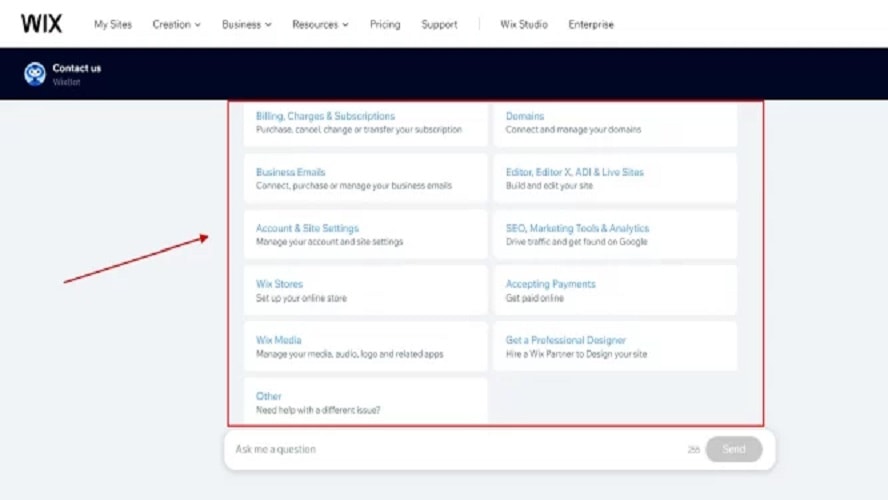
In terms of customer support resources, Wix takes a significant lead over Shopify. Wix offers users a comprehensive support center replete with articles and frequently asked questions (FAQs) to facilitate seamless navigation of their digital platform. This easily accessible repository of guidance and information gives Wix a distinct advantage.
On the other hand, Shopify, while offering support, does not emphasize this feature as prominently as Wix. The absence of an extensive support center similar to Wix's means that users may need to rely on alternative sources of assistance, potentially leading to a steeper learning curve for Shopify users. Wix's commitment to user-friendly support resources positions it favorably for those seeking comprehensive assistance.
Shopify's Mobile App Dominance Surpasses Wix for On-the-Go Management

Shopify transcends Wix when it comes to mobile management. The Shopify mobile app empowers users to effortlessly oversee all critical aspects of their online business operations, such as tracking sales, fulfilling orders, and monitoring inventory levels, all from the convenience of their smartphones. This level of accessibility elevates the user experience significantly.
In contrast, Wix does not offer a dedicated mobile app with similar mobile-specific features. While Wix remains a powerful web development platform, it does not provide the same level of on-the-go management and control as Shopify's mobile app. For entrepreneurs seeking seamless mobile management, Shopify stands as the clear choice.
Shopify's Multi-Channel Selling Capability Outpaces Wix for Expanding Market Reach
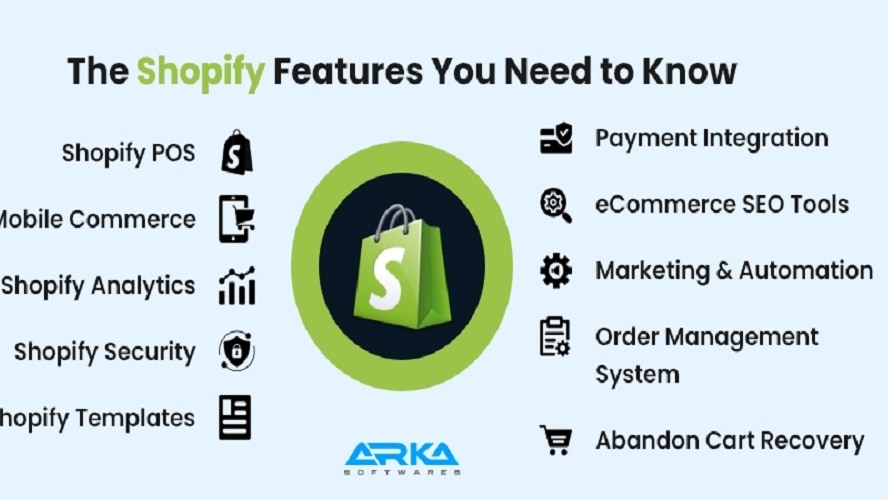
Shopify hails over Wix regarding multi-channel selling, offering entrepreneurs the opportunity to expand their market reach significantly. Shopify allows users not only to sell products from their online store but also seamlessly integrate with various online marketplaces, such as Amazon, eBay, and social media platforms like Facebook and Instagram. This multi-channel approach enables entrepreneurs to tap into a broader audience and diversify their sales channels effectively.
On the contrary, Wix does not explicitly mention a similar multi-channel selling feature, which positions Shopify as the preferred choice for entrepreneurs seeking to maximize their reach and boost sales through the convenience of multi-channel selling strategies.
Shopify's Expansive Integration Ecosystem Outshines Wix for Scalability

Diving into integrations, Shopify undeniably stands out as the superior choice. While Wix offers a respectable selection of applications in its app market, Shopify takes the lead with a thriving ecosystem featuring thousands of seamlessly integrating apps. This extensive library covers a wide spectrum of needs, from SEO tools to social media marketing, email management solutions, analytics, and beyond. Entrepreneurs find in Shopify a versatile toolkit for scaling their online businesses, offering access to more extensive and advanced solutions crucial for sustainable growth.
In contrast, Wix's integration offerings, while helpful, primarily cater to the needs of smaller businesses or startups that may not be heavily focused on e-commerce expansion. Shopify's integration prowess positions it as the go-to platform for those seeking scalability and robust growth potential.
Wix's Visual Editor and App Market Elevate Website Customization Beyond Shopify
While both platforms facilitate website creation and customization, Wix distinguishes itself by offering a robust visual editor tool for effortless drag-and-drop website construction. This user-friendly feature empowers individuals and businesses to craft websites with remarkable ease and precision, even without extensive technical skills.
Wix further enhances customization by allowing users to seamlessly integrate custom animations and professional applications through the Wix App Market. This extensive marketplace offers a wide array of third-party apps and extensions to enhance a website's appearance and functionality.
In contrast, Shopify, while proficient in e-commerce capabilities, lacks a comparable visual editor and a comprehensive app marketplace for overall website customization. Wix's dedication to visual design and versatile app integration positions it as a formidable choice for those seeking unparalleled website customization options.
Wix's Intuitive Interface Outshines Shopify for User-Friendliness
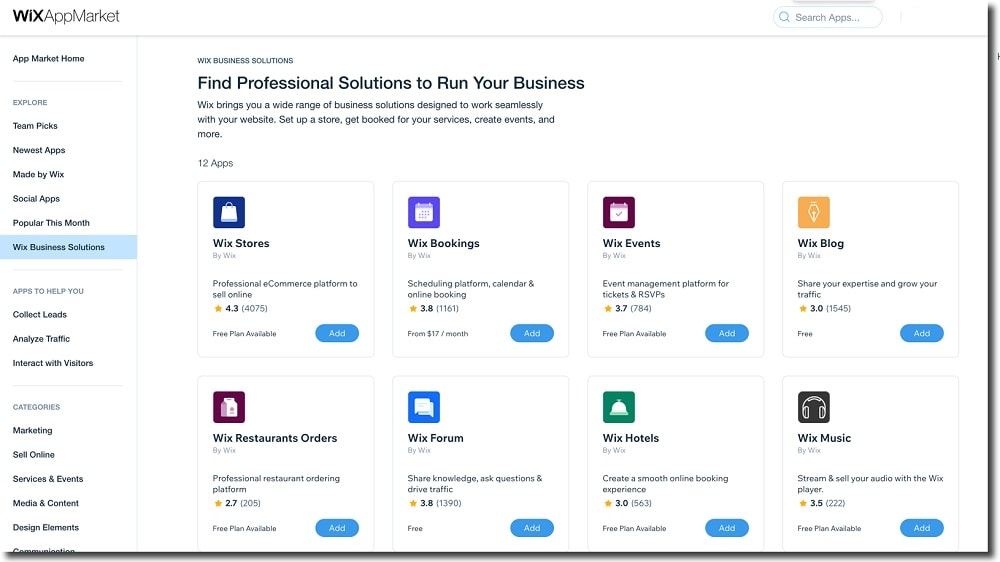
When it comes to ease-of-use, both Wix and Shopify offer user-friendly platforms, but Wix takes the lead in terms of simplicity and accessibility. Wix's drag-and-drop website builder stands as a shining example of user-friendliness. It empowers beginners with a seamless website creation process, even without prior technical knowledge. The platform's extensive collection of templates ensures that customization is a straightforward task, enabling entrepreneurs to craft professional-looking websites effortlessly.
On the contrary, while Shopify also prioritizes user-friendliness, it presents a somewhat steeper learning curve, particularly when it comes to tailoring the aesthetics of your online store. While Shopify excels in e-commerce functionality, it may initially appear slightly complex, making it less approachable for those who are new to the digital landscape.
Robust Analytics Dashboards Enhance User Experience on Wix and Shopify
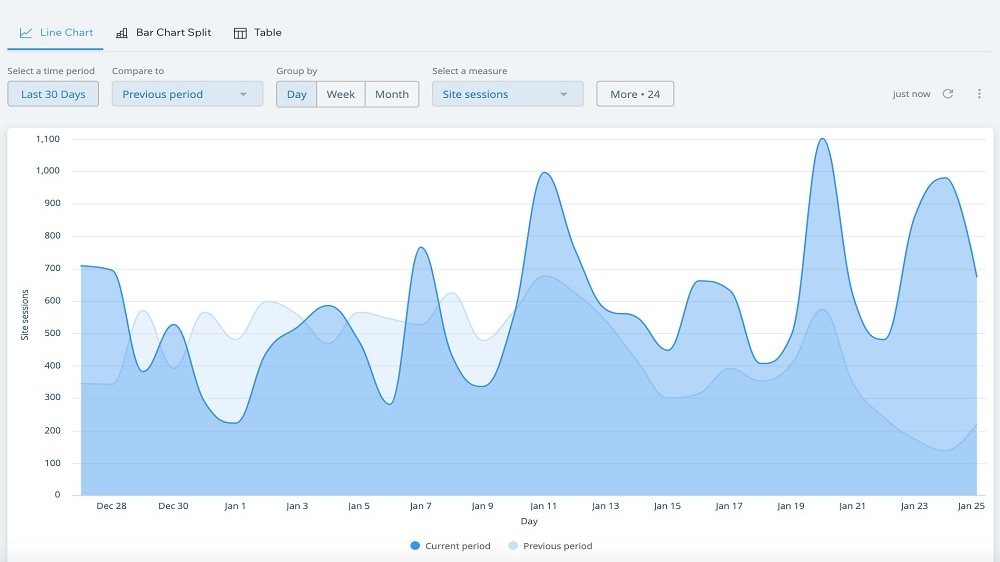
Both Wix and Shopify prioritize delivering entrepreneurs comprehensive and high-quality analytics data to optimize their websites effectively. These platforms feature intuitive analytics dashboards that empower users to gain profound insights into their website's performance, ultimately enhancing the visitor experience and enabling effective online business management.
For example, Wix's analytics dashboard provides valuable data on website traffic, user behavior, and engagement metrics. Users can track visitor demographics, page views, and the effectiveness of marketing campaigns. Similarly, Shopify offers robust analytics tools, enabling e-commerce businesses to monitor sales, customer behavior, and inventory performance.
Subscribe to our newsletters.
No FOMO here. Stay up-to-date on all the latest deals and news with our monthly newsletter straight to your inbox like 120,000+ entrepreneurs (+ Get 10% off on on our Premium Membership!)
Wix vs Shopify: Which is the best for your business?
Wix is the best tool for you if:
- You value a straightforward, intuitive interface for building websites, making it ideal for beginners or those with limited technical expertise.
- Design flexibility is a priority, offering a wide range of customizable templates and design options suitable for various business types and personal projects.
- You're seeking a cost-effective solution, with various pricing plans that cater to different budgets and needs, including free options with basic features.
- Your focus is on creating a visually appealing online presence, with rich multimedia capabilities like video backgrounds and animation effects.
- Integration with various third-party apps and services is essential, as Wix supports a diverse ecosystem for enhancing your website's functionality.
Shopify is the best tool for you if:
- Your primary goal is to operate a robust e-commerce platform, with advanced features like inventory management, payment processing, and shipping options specifically tailored for online retail.
- Scaling your business is a key focus, as Shopify offers extensive tools and apps to accommodate growing product lines and increasing customer traffic.
- You require comprehensive analytics and reporting tools to track sales, customer behavior, and other key metrics vital for informed decision-making in e-commerce.
- Integration with a wide range of marketplaces and social media platforms is crucial for expanding your online presence and reaching a broader audience.
- You need a reliable and secure platform for online transactions, with built-in SSL certificates and compliance with PCI standards to ensure customer data protection.

10% off monthly or annual plans on Wix
Get 10% off monthly or annual plans on Wix and up to $63 savings with Secret.
Alternatives to Wix & Shopify
Promotions on E Commerce software
Start saving on the best SaaS with Secret.
Secret has already helped tens of thousands of startups save millions on the best SaaS like Wix, Shopify & many more. Join Secret now to buy software the smart way.






















